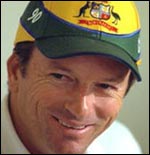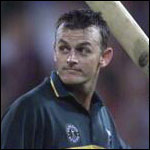The ultimate test
Daniel Laidlaw
Steve Waugh and the Australians have their eyes on India. A scan of Waugh's post-series comments makes that abundantly clear. Talk of the Indian tour, still five weeks and a taxing 10-match one-day tournament away, began even before the competitive fifth Test against the West Indies, when Stuart MacGill (7/104 and 0/88) and Colin Miller (2/73 and 4/102) were said to be competing for the spinners' berth in India.
 Afterwards, Waugh revealed with trademark honesty that Australia had set its sights on India as far back as the start of the summer. It is evident where this season's biggest challenge lies for the Australian cricket team.
Afterwards, Waugh revealed with trademark honesty that Australia had set its sights on India as far back as the start of the summer. It is evident where this season's biggest challenge lies for the Australian cricket team.
Despite the record 15-match winning streak, the series whitewash and the accolades and comparisons to great teams of the past, Waugh acknowledges
that his side will primarily be judged on what it achieves in India. He
could have been forgiven for thinking there is nothing left to prove. But,
unwilling to hide behind past achievements, Waugh knows the streak is
partly a by-product of playing at home and meeting some weak opponents.
India is the ultimate test and a series victory there has been a long-time
Australian goal.
The tour will arrive at the end of another arduous Australian summer -- the
five-Test series against West Indies was squeezed in over six weeks, with
Michael Slater saying it felt like the last Test went eight days and Jimmy
Adams voicing similar weary comments -- but if the right players are rested
beforehand and a professional attitude adopted, this cannot be an excuse
for any poor performances.
A packed one-day tournament takes place over the next month and if the
Australian team selectors continue to implement sensible player
management, the key players who have leading roles in both forms of the
game will be given time to rest. The players may object but it is surely
the way of the future. It's hardly likely that the schedule of matches
will decrease so if players are financially compensated for periods of
enforced rest to enhance their longevity, they should understand the
reasoning. It is important to ensure the likes of McGrath, Gillespie, Mark
Waugh and Ponting are fit and mentally refreshed for India.
 It should be remembered that the last time Australia toured the
subcontinent, it lost a three-Test series to Sri Lanka 1-0. That result in
September of 1999 was, in fact, the Aussies' last loss anywhere. By
employing selective memory it could be brushed off as a rain-marred
series, but the reality is that Australia were thoroughly outplayed and if
rain had not ruined the final two Tests the result would have been 2-1 to
Sri Lanka. That first Test loss is one of only four defeats Australia has
suffered since its last trip to India in 1998. Remarkably, Aussie
vice-captain Adam Gilchrist is yet to know anything other than victory in
his 14 Tests since replacing Ian Healy at the start of last season.
It should be remembered that the last time Australia toured the
subcontinent, it lost a three-Test series to Sri Lanka 1-0. That result in
September of 1999 was, in fact, the Aussies' last loss anywhere. By
employing selective memory it could be brushed off as a rain-marred
series, but the reality is that Australia were thoroughly outplayed and if
rain had not ruined the final two Tests the result would have been 2-1 to
Sri Lanka. That first Test loss is one of only four defeats Australia has
suffered since its last trip to India in 1998. Remarkably, Aussie
vice-captain Adam Gilchrist is yet to know anything other than victory in
his 14 Tests since replacing Ian Healy at the start of last season.
The brand of Test cricket Australia now plays is unique. Two familiar
watchwords are "aggressive" and "positive", tenets which have occasionally
been carried to the point of impatience, particularly in the batting when
it has led to reckless shots. This is potentially Australia's downfall, as
batting remains the area most likely to crack under pressure.
Australia's batting statistics from the West Indies series are
interesting. They took an upturn in the final Test, but until then had
been somewhat shaky. Starts of 4/117 (Brisbane), 4/123 (Perth), 4/105
(Melbourne) and 4/157 (Sydney) in the first innings of four of the five
Tests reveal a top order not performing at its best. And this was at home
against a West Indian attack which lacked depth and had no individual make
a significant impact (Merv Dillon, who missed the last Test through
injury, led the wicket-takers with 16 at 29.9).
Perhaps the statistics were not as impressive due to team-oriented ethics
of attacking from the outset, but Matthew Hayden (236 runs at 29.5) and
Justin Langer (203 at 25.4) both had disappointing series' while the
Waughs were the only Aussies to score hundreds. How this win-at-all-costs
batting approach will fare in India is one of the more intriguing
unknowns.
 Another area of focus before the tour will be whether or not Shane Warne
is selected. His selection will likely be contingent upon his form in the
one-day series, though at this stage he is making all the right noises and
will probably be on the plane. That's bad news for Stuart MacGill, who may
not to get to test himself against Tendulkar and co. if the touring party
includes only 14, as Colin 'Funky' Miller is preferred for spin variation.
Another area of focus before the tour will be whether or not Shane Warne
is selected. His selection will likely be contingent upon his form in the
one-day series, though at this stage he is making all the right noises and
will probably be on the plane. That's bad news for Stuart MacGill, who may
not to get to test himself against Tendulkar and co. if the touring party
includes only 14, as Colin 'Funky' Miller is preferred for spin variation.
What makes the Australian tour of India so compelling from an Aussie point
of view is that it pits form against history: The seemingly unbeatable
Australian juggernaut versus a history of being unable to win in India for
the last 30 years. Australia's dead rubber victory in the third match at
Bangalore in '98 was its first Test win -- not a series triumph, just a
lone Test victory -- in India since Bill Lawry's side claimed the series
there in 1969/'70. That drought is slightly over-rated, though, since
there have only been four tours there since that time -- or one every seven
or eight years -- including the one-off Test in '96. Still, if the current
side is to be regarded as one of Australia's best from any era, then it
simply must prove it can win in all conditions.
India want revenge. Australia is desperately keen to prove it can win
there. The Aussies are on the way!
Check out Australia's record in India:
Australia one-up on India
Mail Daniel Laidlaw